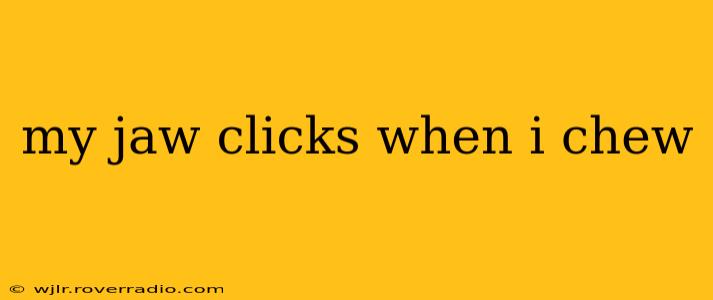Experiencing a clicking jaw while chewing is a common problem, often associated with temporomandibular joint (TMJ) disorders. This condition affects the joints that connect your jaw to your skull, causing a range of symptoms beyond just clicking. Understanding the causes, symptoms, and treatment options for this issue is crucial for managing discomfort and restoring proper jaw function.
What Causes My Jaw to Click When I Chew?
The clicking sound usually originates from the temporomandibular joint (TMJ), a complex hinge joint allowing for jaw movement. Several factors can contribute to TMJ clicking:
- Dislocation of the articular disc: The articular disc is a cartilage cushion within the TMJ. If this disc is displaced, it can cause clicking, popping, or even locking of the jaw. This is a common cause of clicking.
- Inflammation: Inflammation of the joint lining (synovitis) can lead to clicking and pain. This inflammation can be triggered by various factors, including injury, arthritis, or overuse.
- Ligament damage: The ligaments supporting the TMJ can become stretched or damaged, leading to instability and clicking. This often results from trauma or repetitive jaw movements.
- Osteoarthritis: The cartilage within the TMJ can wear down over time, particularly with age, leading to osteoarthritis and clicking sounds.
- Muscle spasms: Tight or spasming muscles around the jaw can also contribute to clicking and discomfort. Stress and bruxism (teeth grinding) are often contributing factors.
What Other Symptoms Might I Experience?
While clicking is a primary symptom, other signs of TMJ disorder can include:
- Pain: Pain in the jaw, temples, or face is frequently associated with TMJ issues.
- Limited jaw movement: Difficulty opening or closing your mouth fully.
- Headaches: TMJ disorders often trigger headaches, particularly tension headaches.
- Earaches: Pain or discomfort in the ear can also be a symptom.
- Neck pain: Muscle tension and inflammation can radiate to the neck.
- Facial pain: Pain in the cheeks or face can be experienced.
How is TMJ Clicking Diagnosed?
A dentist or oral surgeon will usually perform a physical examination to diagnose TMJ disorders. They will assess your jaw's range of motion, check for tenderness, and listen for clicking or popping sounds. Imaging techniques like X-rays or MRI scans may be used to visualize the joint and rule out other conditions.
What Treatment Options Are Available for Jaw Clicking?
Treatment for TMJ clicking depends on the severity of your symptoms and the underlying cause. Options can range from conservative approaches to more invasive procedures:
- Conservative Management: This typically involves lifestyle modifications such as stress management techniques, applying heat or ice packs, avoiding jaw-jarring activities, and adopting better posture. Over-the-counter pain relievers may also be recommended.
- Mouthguards or splints: Custom-made mouthguards or splints can help to realign the jaw and protect the teeth from grinding, reducing stress on the TMJ.
- Physical therapy: Exercises to strengthen the jaw muscles and improve range of motion can be beneficial.
- Medications: Doctors may prescribe muscle relaxants, pain relievers, or anti-inflammatory medications to alleviate pain and reduce inflammation.
- Injections: Corticosteroid injections may be used to reduce inflammation within the joint.
- Surgery: Surgery is generally considered a last resort for severe cases that haven't responded to conservative treatments.
Can I Prevent TMJ Clicking?
While not all cases of TMJ clicking are preventable, you can reduce your risk by:
- Managing stress: Stress is a significant contributing factor to TMJ disorders. Incorporating stress-reducing techniques such as yoga, meditation, or deep breathing exercises can help.
- Maintaining good posture: Proper posture can help to reduce strain on the jaw and neck muscles.
- Avoiding jaw-jarring activities: Activities such as chewing gum excessively, biting your nails, or clenching your teeth should be minimized.
- Eating softer foods: If your jaw is particularly painful, eating softer foods can reduce the strain on your TMJ.
When Should I See a Doctor?
If you're experiencing persistent jaw clicking accompanied by pain, limited jaw movement, or other symptoms, it's essential to seek professional medical attention. Early diagnosis and treatment can significantly improve your chances of managing the condition effectively.
This information is for general knowledge and does not constitute medical advice. Always consult with a healthcare professional for diagnosis and treatment of any medical condition.
